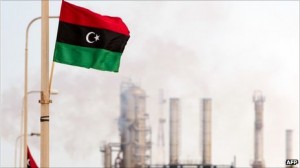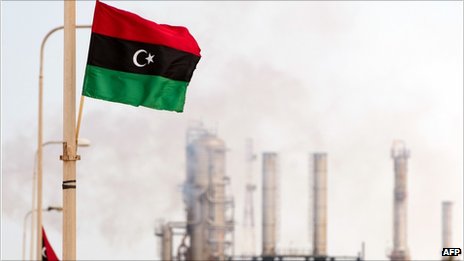
(AFP Photo)
The Libyan Monetary Authority (LMA) has refused to allow Egyptian banks to carry out banking activities in the Libyan market, according to the Deutsche Presse-Agentur (DPA).
The LMA said, however, that the move was a temporary one, effective only until rules governing the entry of foreign entities into Libya’s banking sector were finalised by lawmakers.
“The LMA is yet to set rules to guarantee new licenses for foreign entities to practice banking activities, and to set controls allowing free access to cash,” said banking expert Tariq Helmy.
The LMA informed the National Bank of Egypt (NBE), the country’s largest bank, of their refusal of the bank’s request to enter the market Libyan market, according to the London-based Al-Sharq Al-Awsat newspaper.
NBE has requested a number of times to enter the Libyan market, as part of an expansion strategy to penetrate markets in Africa such as Sudan and Ethiopia, Arab countries such as the UAE and overseas countries such as Turkey and Italy.
NBE has studied a number of opportunities in these markets, which are still ongoing.
“Libya doesn’t permit foreign banks on its territories,” said Ahmed Adam, a banking expert. “But the National bank of Egypt is just trying to show off to catch more propaganda.”
He continued: “In wake of the current circumstances in Libya, it will be difficult and dangerous to start a business there.”
He added that Italian construction companies and US banks are also currently eyeing the Libyan market.
“I don’t think the decision has any political elements, no more than Libya still not stable , and it needs time to redefine its laws and security legislations to secure its economy, so they can permit foreigners banking afterwards” said Helmy.
Adam confirmed that arresting former Ahmed Gaddafi Al-Dam, Muammar Gaddafi’s cousin and top aide, “is a good step”.
Helmy said the situation in Libya is “worse than Egypt”, especially in terms of security, “since they are tribes, which makes the economic situation unstable”.
“Before its revolution, Libya opened the doors for foreign investments and banks, but now Libya needs first to organise its laws, and its financial and economic decisions,” said Helmy.
He added that a factor in the unstable relations between the two countries is Egypt’s refusal to extradite former members of the Gaddafi regime currently residing in Egypt.
“I hope arresting Gaddafi Al-Dam will be a good move to effect reconciliation between both Egypt and Libya,” he said.
He continued: “Libyan-Egyptian bilateral relations will probably need around six months to a year to return back to normal.”
Commenting on NBE’s expansion strategy, Helmy expected that Libya’s refusal would be unlikely to affect the strategy adversely, and he recommended that NBE concentrate on branching out into Sudan.
Some experts have attributed the latest developments in Egyptian-Libyan bilateral economic relations to the uneasy political relationship between the two countries.
“We are currently working to allow Egyptian contractors to enter into the Libyan market,” said CEO of the Egyptian Federation for Construction and Building Contractors (EFCBC) Hassan Abdel Aziz. “Especially since they are currently facing political problems.”
Helmy said that Egypt refused to extradite former Gaddafi regime members since the government in Cairo believes there are currently no indictments against them. “The situation is similar to the European reaction with Egypt when they refused to hand over funds belonging to former members of the Mubarak regime who have funds in European banks,” he added.
On Tuesday, Sayed Abu Zayd, a member of the Egyptian Council for Foreign Affairs (ECFA), told independent Al-Watan Newspaper that arresting Ahmed Gaddafi Al-Dam will make Libyans more confident that Egypt will support them “in achieving their most important demands”.
“This step will create some kind of trust and affection between the two sides,” he continued. “And will help pump Libyan investments into Cairo.”
Abu Zayd called on both countries to work to develop both their economies as soon as possible, especially since both have suffered losses after their revolutions.
On Wednesday Libya called on Egypt’s prosecutor general to extradite 36 former Gaddafi-regime members including Gaddafi Al-Dam, according to state-owned Ahram.
The Media Office at Libya’s Central Bank has however denied that the LMA has refused to allow Egyptian banks to conduct banking activities in Libya, according to Al-Ahram.




